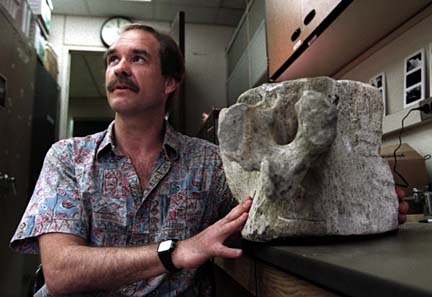
STAR-BULLETIN / 1998
University of Hawaii oceanographer Craig Smith, shown here with a whale vertebrae he was studying in 1998, has received a $150,000 fellowship to design marine-protected areas in international waters.
UH researcher
wins ocean grantCraig Smith says some fragile
species are in jeopardy due
to seamount fisheries
University of Hawaii oceanographer Craig Smith is one of five recipients of a coveted fellowship awarding him $150,000 over three years to conduct marine conservation projects.
Smith won the Pew Marine Conservation Fellowship for a project to design marine-protected areas in international waters.
"What we do will be relevant to seamounts in territorial waters, like the Northwestern Hawaiian Islands, but they fall under different legal jurisdiction," he said.
Smith has been collaborating with Australian scientist Tony Koslow, a world expert on seamount diversity, to study the environmental impact of manganese nodule mining.
Their investigations are focused on the ocean floor area roughly west of Baja California. Six countries have exploration plans in international waters, but the U.S. consortium has pulled out, Smith said.
The scientists also are looking at deep sea seamounts that are heavily fished in international waters. Using ships and submersibles, they plan to collect information about the biological characteristics and habitat distribution of western Pacific seamounts.
"It's really a neat opportunity," Smith said. "Humans are having a dramatic impact on many deep sea ecosystems but because they're out of sight to most people, they aren't aware of them."
He said animals that live in deep sea communities are "very fragile with very low growth rates and can't deal with disturbance well. It takes them a long time to recover."
Deep sea fishing is especially a big problem, he said. "A number of deep sea species are being exploited. They can't sustain fishing pressure."
Seamount fisheries "not only are really hammering a lot of species that have low capacity to recover," he said, but trawls dragged across the bottom are destroying their habitat. "It may take centuries to recover."
One of the project's goals is to develop management techniques to designate marine protected areas and preserve the biodiversity, he said.
Recommendations will be made to the National Seabed Authority established by the United Nations to administer deep seabed resources and protect the deep sea environment from excessive damage, he said.
The UN is particularly concerned about the effects of seamount fishing on marine communities, he said.
Smith said the project involves a lot of international scientific collaboration. But how to get fishermen in international waters to honor protected areas is another matter, probably requiring some kind of enforcements, he said.
He said he will participate in a cruise in June with French scientists, using the Nautile, a state-of-the-art French submersible that dives 15,000 feet.
In two weeks, he will go on a cruise related to his studies of whales that die and sink in the ocean.
He has pioneered research on rotting whales on the sea floor, investigating relationships between animals that live in sulfide-rich whale carcasses and hydrothermal vents in active rift zones.
"It's turned out to be really exciting," he said, noting his findings indicate whaling may have affected deep sea communities.
"I think there is a good chance of substantial species extinctions from animals dependent upon whale falls. No one really thought of a connection between whales and the upper ocean and diversity in the deep sea."
Smith joined UH-Manoa in 1988. He has worked extensively with the International Seabed Authority on nodule mining environmental impacts. He has organized international projects to address possible species extinctions from deep-sea mining.
He has appeared on many national TV and radio broadcasts in the U.S. and other countries and has published more than 70 papers in professional journals.
